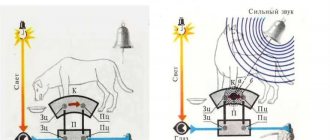A reflex is a spontaneous reaction to a certain external factor. It can be unconditional or conditional. The first contributes to human existence in the external environment. Each child is born with a certain set of such reactions, and among them is the sucking reflex, which provides the baby with the conditions for survival.
Sometimes there is a problem with its formation, i.e. it is either completely absent or simply weakened. This is fraught with various complications when feeding a newborn. Young parents definitely need to understand this issue so that, when faced with this kind of pathology, they know how to behave and what to do.
What it is
The segments of the brain stem are responsible for the sucking reflex in newborns. The nuclei of nerve pairs located in the medulla oblongata (its stem part) participate in its activation:
- trigeminal;
- vestibular;
- facial;
- wandering;
- glossopharyngeal;
- sublingual.
The interconnection of these nerves strictly coordinates the entire sucking process from beginning to end. After feeding, the reflex weakens, and after 1-1.5 hours it is activated again. The newborn will suck everything that is in his mouth: his mother’s breast, his nipple (if he is artificial), his own fingers. This is not a habit at all, as it begins to form during the period of intrauterine development.
Scientists have found that this unconditional reaction of the body has a great impact on the health of the child’s psyche. Thanks to its possession, the baby can satisfy his hunger, which ensures his survival. Therefore, a poor sucking reflex should be an alarming signal for parents that measures are needed to quickly restore it before it is too late. But how to find out about pathology? Only by comparing it with the norm and checking its symptoms.
This is interesting! The sucking reflex is established already after 15 weeks after conception, i.e. long before the child is born.
Norm
There is a norm when the sucking reflex appears in a child (at what age) and when it fades away. This is important to know in order to track whether everything is okay with the baby’s development. Any kind of deviation indicates that medical attention and correction are needed.
- Makings of
The beginnings of the sucking reflex are already visible on ultrasound, i.e. in the mother’s womb. On the monitor you can see how the baby holds his finger in his mouth - this is the norm.
- Formation
The sucking reflex is finally formed in the very first minutes of a newborn’s life. If it is healthy and full-term, it is applied immediately to the mother’s breast. Having received a few drops of precious colostrum, the baby calms down. In this simple but very important way, the sucking reflex is activated and the innate instinct is supported.
- Fading
Scientists have found out when a child’s sucking reflex normally fades away, performing a protective function for the body. However, opinions may differ as to what age this reaction of the body persists. Most often they say 1-1.5 years, when it is recommended to wean the baby off the pacifier. Although many advise breastfeeding until 2.5 years, which is also directly related to the sucking reflex. So the age range when a child’s sucking reflex disappears is quite blurred and uncertain.
This is a typical way of forming this unconditional reaction. But sometimes doctors are forced to diagnose (parents can independently notice) that there is no sucking reflex in a newborn: a certain number of problems with his health disrupt either its development during pregnancy, or its activation after the birth of the child.
Wow! There are also cases where overly conscientious mothers continued breastfeeding up to 6-7 years, thereby stretching the age limits for the extinction of the sucking reflex.
Causes of pathology
Parents should understand that if a child does not have a sucking reflex, he has serious health problems that need to be addressed immediately with the help of doctors. There are several reasons for this pathology:
- hypoxic or traumatic damage to the central nervous system, which can occur either in the womb or during childbirth (read about fetal hypoxia here);
- disruption of one of the nerves involved in the formation of the sucking reflex, most often paresis or paralysis, in particular the facial nerve;
- birth injury of the medulla oblongata;
- weakness of the tongue, orbicularis oris muscle, masticatory muscles;
- somatic illness in a severe stage;
- mental retardation;
- some diseases of the mouth and pharynx: pronounced stomatitis, rhinitis, respiratory viral infections (ARVI, acute respiratory infections);
- flat shape of the mother’s nipples;
- deep prematurity, when the baby’s weight does not exceed 1.5 kg.
If the course of pregnancy or childbirth was complicated by these factors, the newborn has no sucking reflex at all or is reduced to a minimum, which is fraught with starvation of the baby and its defective development (both physical and mental) in the future. If you fall into a risk group, it is necessary from the first moment the child is born to check the degree of formation of this unconditional reaction of the small organism. There are several ways to do this. Moreover, parents themselves can see the pathology, presenting its obvious symptoms.
For your information. Flat nipples are not a reason to wean your baby off the breast. There are ways to pull them out. There are a number of special exercises, correctors in pharmacies, and surgical intervention. Take care of this problem in advance, because the formation of a sucking reflex in a child also depends on it.
Why might he be missing?
If this action is weak, the baby sucks very sluggishly at the breast or bottle, quickly falling asleep during feeding, or even refusing to eat altogether. This happens in weakened, injured during childbirth or premature babies. They are discharged from the inpatient department when the baby gets used to sucking milk well. A decrease in the sucking reflex can be observed for the following reasons:
- hypoxic-traumatic damage to the central nervous system of the child in the womb or during childbirth;
- severe somatic diseases (due to general weakness and malaise);
- paresis and paralysis of the cranial nerves, in particular the facial one;
- mentally retarded children;
- severe stomatitis, respiratory viral infections, rhinitis;
- flat-shaped mother's nipples.
With a reduced sucking reflex, the child is constantly malnourished, so he must be fed with a spoon or expressed milk from a bottle every 2 or 2.5 hours.
Any deviation in the baby’s condition is a reason to consult a doctor, because this may be a signal of the development of a serious pathology that requires immediate treatment. A decrease in the sucking reflex requires dynamic monitoring with the involvement of a neurologist.
The absence of a sucking reflex is the first symptom of damage to the central nervous system, or rather the stem part of the medulla oblongata, and an unfavorable prognostic sign. Such babies have very little chance of survival; they have to be fed only through a tube.
Reasons for the complete absence of sucking in children:
- trauma to the medulla oblongata during childbirth;
- weakness of the masticatory muscles, orbicularis oris muscle, tongue;
- deep prematurity.
Symptoms
Some signs may indicate the absence of a sucking reflex or its underdevelopment in a baby. Usually they are detected in the maternity hospital, where all measures are taken to save the child. But if for some reason the doctors did not recognize the pathology, the mother herself will be able to see that this reaction of the small organism is underdeveloped. Symptoms of deviation may be as follows.
Complete absence
When attaching a newborn to the mother's breast:
- he doesn't even try to grab the nipple;
- if you put the breast in his mouth, he will not make any attempts to suck it, will not hold it in his mouth;
- this condition lasts more than 12 hours after the birth of the child.
If this is the situation, urgent medical attention is needed. Parents often ask when the sucking reflex appears in premature babies, since in such babies this protective unconditioned reaction develops much later than in healthy ones, develops poorly or is absent altogether.
Even with prematurity, with appropriate medical care, the reflex should appear within 24 hours (this is considered normal). A longer period of time will indicate a serious problem.
Underdevelopment, partial immaturity
After putting your baby to the breast immediately after birth:
- he makes a few weak smacks;
- cannot hold the nipple in his mouth, although he tries to do so;
- does not calm down, but on the contrary, begins to cry even more.
Over the next few days, a poor sucking reflex may include the following:
- the baby does not so much suck the breast (pacifier) as smack loudly;
- constantly releases the nipple from the mouth, cannot hold it;
- feeding can last a long time, but at the same time the breast remains almost full, and the baby remains hungry;
- rarely swallows;
- lethargic;
- falls asleep right at the beginning of feeding;
- he is capricious, cries loudly, sleeps poorly, bends over - all this is due to hunger.
If you notice a weak sucking reflex in your newborn, but are not sure whether you are right or wrong, it is better to consult a doctor. He will definitely refute or confirm the diagnosis. You can only put your own finger in the baby’s mouth and observe his reaction. Normally, a healthy baby will immediately grab it and begin to suck intensively. A premature or injured baby will not make sucking movements. Self-medication in this case is excluded: qualified assistance is required.
Helpful information. After discovering the absence of the sucking reflex, you should immediately consult a doctor, preferably a pediatric neurologist or neurologist. This is his field of activity.
How long does this phenomenon last?
Until what age does a newborn develop a sucking reflex?
As already noted, a born baby begins to suck after 2-3 hours, and the formation and emergence of this reflex occurs long before birth. A few hours after birth, the baby begins an active search for the mother's breast in order to realize its natural instinct.
The duration during which the sucking reflex in infants is most pronounced is the first 12 months of life. Then, closer to a year, it begins to weaken. And by about 3-4 years it disappears completely.
For this reason, many experts agree that breastfeeding is necessary until the sucking reflex completely disappears in accordance with the norms inherent in nature.
Weak sucking reflex
The weakness of the touch instinct can be determined during the feeding process. Healthy babies immediately and greedily take their mother’s breasts and suck on them quite actively. And newborns, in whom this reflex is reduced, fall asleep during feeding, they rarely swallow, are lethargic, often completely refusing the mother's breast.
The main reasons for a decrease in the sucking reflex in a newborn include:
- hypoxia during pregnancy or childbirth;
- severe somatic conditions;
- mental retardation;
- paresis of the facial nerves;
- sometimes ARVI, stomatitis.
The reason may also be improper attachment of the baby to the mother's breast:
1. First, make sure that the baby is completely awake and wants to eat. To do this, run your finger along the corner of your mouth. If the baby is hungry, he will try to grab your finger, confusing it with the nipple.
2. Check if you have attached your baby to the breast correctly:
- the baby's chin is pressed to the chest;
- his mouth is wide open;
- the lower lip is pushed down;
- the distance between the baby's upper sponge and the nipple should be greater than under the lower one.
3. If the baby has difficulty breathing (due to a cold or runny nose), this is also an obstacle to the full implementation of the reflex. At the same time, the baby will suck sluggishly and take breaks.
4. Also, the reason for the weakening of the instinct may be the incorrect shape of the nipples (inverted) - use special pads.
If you cannot cope with the problem, it would be more advisable to contact a breastfeeding specialist, since this trouble may hide serious disturbances in the functioning of the central nervous system.
Treatment
To develop the sucking reflex in a newborn, inpatient treatment will be required under the mandatory supervision of a doctor. Not only pediatricians, but also neurologists already work here. The recovery course can last different times, depending on the individual characteristics of the small organism and the cause of the pathology. Typically, resuscitation of the unconditioned reflex occurs as follows.
In complete absence
- Treatment of the root cause (trauma, oxygen deprivation, somatics, etc.).
- If within 12 hours the baby’s sucking reflex did not manifest itself and he was not attached to the mother’s breast, parenteral (i.e., passing by the intestinal tract) nutrition is prescribed, usually with a glucose solution.
- Tube feeding is practiced at the birth of premature babies with a clear decrease in the sucking reflex. The amount of food is dosed with a syringe based on the baby’s weight.
- They are allowed to switch to bottle feeding after the reflex is fully restored.
- The issue of breastfeeding is decided in each individual case individually. In this case, the general condition of the newborn and the stability of his reflex signs are taken into account. It is recommended to start with 1 or 2 times a day. However, the child may become very tired of this, and then you have to feed him with a bottle. Typically, such babies are sent for feeding up to 10 times a day. The main thing here is not to rush things.
With partial unformation
- Supplementary feeding: since with a poor sucking reflex the baby is constantly malnourished, he is given expressed milk from a spoon or bottle
- A clear feeding schedule: every 2-2.5 hours.
- Dummy.
- Facial massage before meals.
With a competent approach to the problem, the sucking reflex in the newborn is completely restored, which has virtually no effect on its further development. This is possible if resuscitation measures take no more than 1-2 weeks. If they drag on, the reflex may not return to the child at all or this will happen only partially. In this case, there is no need to wait for comforting forecasts.
In addition. If the facial nerve is damaged or the masticatory muscles are underdeveloped, a therapeutic massage is prescribed, which gives good results.
The importance of the sucking reflex in the development of a newborn child
Reflexes are spontaneous reactions to any external irritating factor. They are characteristic of all multicellular organisms, including animals and humans. Reflexes are unconditioned and conditioned.
The first group is always with a person, contributing to his existence in the external environment - these are innate reflexes. The second group represents neurological signs that appear and disappear during a person's life. Each child is born with a certain number of unconditioned reflexes, among them the sucking reflex and other automatisms that provide the new person with the conditions for survival.
What is the sucking reflex?
It is formed in a child in the first minutes of life, and its inclinations appear in the womb; on an ultrasound, it is often visible how the fetus holds its finger in its mouth. If the baby was born healthy and full-term, he is immediately applied to the mother's breast, and he calms down, receiving a few drops of colostrum. This is how maternity hospitals support the innate instinct and promote the correct establishment of the sucking reflex.
Any kind of touching the baby’s lips causes responses in the form of sucking movements. Doctors know until what age the sucking reflex is normal, performing a protective function - this is the first 12 months of life.
The sucking reflex is realized with the participation of the nuclei of certain nerves located in the stem part of the medulla oblongata. These are the trigeminal nerve, facial, vestibular, glossopharyngeal, vagus and hypoglossal.
The interconnection of these pairs of nerves ensures strict coordination of the sucking process. After finishing feeding, the reflex first weakens, and after an hour or an hour and a half it comes to life again. If the central nervous system or any of the above nerves is damaged, it decreases or disappears completely.
Babies weaned early from mother's milk and fed with formula have the problem of an incompletely realized sucking reflex, which can lead to the development of neurosis of obsessive movements of varying degrees. This is expressed in particular in the following:
- the habit of sucking various objects (finger, pen, pencil, blanket, dolls, etc.);
- habit of biting your nails;
- Adults have a desire to smoke, hold a cigarette in their mouth for a long time, and try to light up quickly under any stress.
Thus, the child must correctly go through the oral stage of development so that there is no formation of neurotic reactions in the future. People deprived of mother's milk at an early stage of development must be brought up with the use of a pacifier as an object of sucking, otherwise an adult during his life may show oral aggression in an active form (biting, snapping verbally, being sarcastic) and passive (poor appetite, all sorts of painful state).
A baby is given a pacifier between feedings; it must be weaned off gradually, during play, with talking and affection, without punishment or screaming. When the sucking reflex fades, nature has determined that a child older than one or one and a half years old does not need it, although the baby will continue to have sucking movements for a long time in his sleep and in subsequent years, until about 3 or 4 years old.
Why might he be missing?
If this action is weak, the baby sucks very sluggishly at the breast or bottle, quickly falling asleep during feeding, or even refusing to eat altogether. This happens in weakened, injured during childbirth or premature babies. They are discharged from the inpatient department when the baby gets used to sucking milk well. A decrease in the sucking reflex can be observed for the following reasons:
- hypoxic-traumatic damage to the central nervous system of the child in the womb or during childbirth;
- severe somatic diseases (due to general weakness and malaise);
- paresis and paralysis of the cranial nerves, in particular the facial one;
- mentally retarded children;
- severe stomatitis, respiratory viral infections, rhinitis;
- flat-shaped mother's nipples.
With a reduced sucking reflex, the child is constantly malnourished, so he must be fed with a spoon or expressed milk from a bottle every 2 or 2.5 hours.
Any deviation in the baby’s condition is a reason to consult a doctor, because this may be a signal of the development of a serious pathology that requires immediate treatment. A decrease in the sucking reflex requires dynamic monitoring with the involvement of a neurologist.
The absence of a sucking reflex is the first symptom of damage to the central nervous system, or rather the stem part of the medulla oblongata, and an unfavorable prognostic sign. Such babies have very little chance of survival; they have to be fed only through a tube.
Reasons for the complete absence of sucking in children:
- trauma to the medulla oblongata during childbirth;
- weakness of the masticatory muscles, orbicularis oris muscle, tongue;
- deep prematurity.
Features of the sucking reflex in premature babies
Babies born prematurely with low birth weight have many different health problems and their own developmental and nursing characteristics. In particular, the sucking reflex in premature babies, as well as the swallowing reflex, is often absent, especially with a body weight of less than one and a half kilograms, when there is underdevelopment of many organs, their small volume, impaired thermoregulation, difficulty breathing, etc.
Inferiority of reflexes is associated with insufficient development of nervous regulation mechanisms and incomplete formation of sucking muscles. Such children cannot be immediately put to the breast, but a long delay is also scary because of the possible large loss of body weight.
A long delay is given in case of severe injury or suspected cerebral hemorrhage. If the child has not been fed for more than 12 hours, he is transferred to parenteral nutrition with a glucose solution. Tube feeding of premature babies is practiced with a significant reduction in sucking and swallowing, while the volume of each feeding is dosed with a special syringe. They switch to bottle feeding after the baby develops good reflexes.
The issue of breastfeeding is decided separately for each child, taking into account his condition and the stability of reflex signs. Usually they start with once or twice a day, if the child gets tired, then they feed him from a bottle; in total, such children are fed up to 10 times a day. The main thing in the process of nursing premature babies is not to force things.
The process can be lengthy, but success is ensured with the competent approach of doctors and the baby’s mother; such children catch up with their peers by the end of the first or maximum third year of life.
Thus, the sucking reflex is one of the most important innate reflexes that human nature has endowed to provide the most comfortable conditions for survival and further development. Its complete absence is an irreparable problem, incompatible with life, and a decrease is a menacing signal about a serious neurological problem, which must immediately begin to be looked for and eliminated in all possible ways with the involvement of neurologists and other specialists.
Rate this article: (votes: 1, average: 5.00 out of 5) Loading...
VashNevrolog.ru
Forecasts
The process of restoring the unconditioned sucking reflex can be quite lengthy. Success is guaranteed with a competent joint approach between doctors and the baby’s parents. According to statistics, such children catch up with their peers by the end of 1 (maximum 3rd) year of life. If the sucking reflex in children was not restored in a timely manner, it has two prognoses:
- Lethal outcome due to hunger, since it is the sucking reflex that prevents people from dying from exhaustion.
- Feeding through a tube, as far as possible, but usually in 90% of cases such children die in the first year of life, in the remaining 10% the life expectancy is no more than 2-3 years, since the gastrointestinal tract is primarily disrupted, yes and other internal organs and systems develop pathologically.
Scientists also note that in children who are weaned early from their mother’s breast and fed with formula, a sucking reflex syndrome is subsequently observed, which is not fully realized. This leads to obsessive movement neurosis, manifested in varying degrees. Manifestations can be very different:
- preschoolers have the habit of putting a variety of objects in their mouths (fingers, pen, pencil, dolls, spoon, etc.);
- schoolchildren have a habit of biting their nails;
- in adults, smoking in large quantities, while they do not remove cigarettes from their mouths for a long time.
For full development in the future, a child must necessarily go through the oral, initial stage of formation of the sucking reflex, so that neurotic reactions are normal. Babies deprived of mother's milk must grow up with a pacifier as an object of sucking. Otherwise, having matured, they can actively show real oral aggression (biting, being sarcastic, snapping), this can also be expressed passively (poor appetite, painful conditions). To prevent such troubles from happening to your baby, preventive measures are necessary, and you need to start using them during pregnancy.
Did you know that... Scolding a child for sucking fingers at any age is strictly prohibited by doctors. This lies in the area of his unconscious, i.e. he cannot control it. This is fraught with serious psychological problems for him.
BabyMother
Good day to all! I’ll get straight to the point - the baby is 2 months old, we breastfeed at the baby’s request, and we don’t wean him off the breast (he hangs on it for an hour at a time, with “smacking” sounds), for the last 3 days we have been TERRIBLY wanting to suckle, and it doesn’t matter what!!! Whether it’s mom’s breast, a fist, a finger (ours, dad’s or mom’s), the edge of a diaper, a pacifier, we don’t care, as long as we suck. At night I also began to wake up more often than before. Sometimes we can simply scream in order to be given a pacifier. Weight gain is normal. We understand that this is his sucking reflex, but can it be in SUCH volumes???? This is the first question. Second question: what should I give him to suck??? let him suck on a pacifier, which seems easier to get rid of later, or let him suck on his hands and what will he have to do (after all, he can’t help but suck)???? We will be grateful for your answers.
Added after 8 minutes 48 seconds:
Another small addition.
When we are not breastfeeding, we forget about everything and about the mobile (with which we talked very actively earlier) and about our parents (with whom we also actively cooed and cooed), we immediately become coooooon. Sometimes we really smile at them without letting go of the pacifier and that’s it. Here’s another question: is it possible in this case (when there is a need for sucking) to overfeed the baby with breastfeeding?????
A reflex is a spontaneous reaction to a certain external factor. It can be unconditional or conditional. The first contributes to human existence in the external environment. Each child is born with a certain set of such reactions, and among them is the sucking reflex, which provides the baby with the conditions for survival.
Sometimes there is a problem with its formation, i.e. it is either completely absent or simply weakened. This is fraught with various complications when feeding a newborn. Young parents definitely need to understand this issue so that, when faced with this kind of pathology, they know how to behave and what to do.
The segments of the brain stem are responsible for the sucking reflex in newborns. The nuclei of nerve pairs located in the medulla oblongata (its stem part) participate in its activation:
The interconnection of these nerves strictly coordinates the entire sucking process from beginning to end. After feeding, the reflex weakens, and after 1-1.5 hours it is activated again. The newborn will suck everything that is in his mouth: his mother’s breast, his nipple (if he is artificial), his own fingers. This is not a habit at all, as it begins to form during the period of intrauterine development.
Scientists have found that this unconditional reaction of the body has a great impact on the health of the child’s psyche. Thanks to its possession, the baby can satisfy his hunger, which ensures his survival. Therefore, a poor sucking reflex should be an alarming signal for parents that measures are needed to quickly restore it before it is too late. But how to find out about pathology? Only by comparing it with the norm and checking its symptoms.
This is interesting! The sucking reflex is established already after 15 weeks after conception, i.e. long before the child is born.
There is a norm when the sucking reflex appears in a child (at what age) and when it fades away. This is important to know in order to track whether everything is okay with the baby’s development. Any kind of deviation indicates that medical attention and correction are needed.
The beginnings of the sucking reflex are already visible on ultrasound, i.e. in the mother’s womb. On the monitor you can see how the baby holds his finger in his mouth - this is the norm.
The sucking reflex is finally formed in the very first minutes of a newborn’s life. If it is healthy and full-term, it is applied immediately to the mother’s breast. Having received a few drops of precious colostrum, the baby calms down. In this simple but very important way, the sucking reflex is activated and the innate instinct is supported.
Scientists have found out when a child’s sucking reflex normally fades away, performing a protective function for the body. However, opinions may differ as to what age this reaction of the body persists. Most often they say 1-1.5 years, when it is recommended to wean the baby off the pacifier. Although many advise breastfeeding until 2.5 years, which is also directly related to the sucking reflex. So the age range when a child’s sucking reflex disappears is quite blurred and uncertain.
This is a typical way of forming this unconditional reaction. But sometimes doctors are forced to diagnose (parents can independently notice) that there is no sucking reflex in a newborn: a certain number of problems with his health disrupt either its development during pregnancy, or its activation after the birth of the child.
Wow! There are also cases where overly conscientious mothers continued breastfeeding up to 6-7 years, thereby stretching the age limits for the extinction of the sucking reflex.
Parents should understand that if a child does not have a sucking reflex, he has serious health problems that need to be addressed immediately with the help of doctors. There are several reasons for this pathology:
- hypoxic or traumatic damage to the central nervous system, which can occur either in the womb or during childbirth (read about fetal hypoxia here);
- disruption of one of the nerves involved in the formation of the sucking reflex, most often paresis or paralysis, in particular the facial nerve;
- birth injury of the medulla oblongata;
- weakness of the tongue, orbicularis oris muscle, masticatory muscles;
- somatic illness in a severe stage;
- mental retardation;
- some diseases of the mouth and pharynx: pronounced stomatitis, rhinitis, respiratory viral infections (ARVI, acute respiratory infections);
- flat shape of the mother’s nipples;
- deep prematurity, when the baby’s weight does not exceed 1.5 kg.
If the course of pregnancy or childbirth was complicated by these factors, the newborn has no sucking reflex at all or is reduced to a minimum, which is fraught with starvation of the baby and its defective development (both physical and mental) in the future. If you fall into a risk group, it is necessary from the first moment the child is born to check the degree of formation of this unconditional reaction of the small organism. There are several ways to do this. Moreover, parents themselves can see the pathology, presenting its obvious symptoms.
For your information. Flat nipples are not a reason to wean your baby off the breast. There are ways to pull them out. There are a number of special exercises, correctors in pharmacies, and surgical intervention. Take care of this problem in advance, because the formation of a sucking reflex in a child also depends on it.
Some signs may indicate the absence of a sucking reflex or its underdevelopment in a baby. Usually they are detected in the maternity hospital, where all measures are taken to save the child. But if for some reason the doctors did not recognize the pathology, the mother herself will be able to see that this reaction of the small organism is underdeveloped. Symptoms of deviation may be as follows.
When attaching a newborn to the mother's breast:
- he doesn't even try to grab the nipple;
- if you put the breast in his mouth, he will not make any attempts to suck it, will not hold it in his mouth;
- this condition lasts more than 12 hours after the birth of the child.
If this is the situation, urgent medical attention is needed. Parents often ask when the sucking reflex appears in premature babies, since in such babies this protective unconditioned reaction develops much later than in healthy ones, develops poorly or is absent altogether.
Even with prematurity, with appropriate medical care, the reflex should appear within 24 hours (this is considered normal). A longer period of time will indicate a serious problem.
After putting your baby to the breast immediately after birth:
- he makes a few weak smacks;
- cannot hold the nipple in his mouth, although he tries to do so;
- does not calm down, but on the contrary, begins to cry even more.
Over the next few days, a poor sucking reflex may include the following:
- the baby does not so much suck the breast (pacifier) as smack loudly;
- constantly releases the nipple from the mouth, cannot hold it;
- feeding can last a long time, but at the same time the breast remains almost full, and the baby remains hungry;
- rarely swallows;
- lethargic;
- falls asleep right at the beginning of feeding;
- he is capricious, cries loudly, sleeps poorly, bends over - all this is due to hunger.
If you notice a weak sucking reflex in your newborn, but are not sure whether you are right or wrong, it is better to consult a doctor. He will definitely refute or confirm the diagnosis. You can only put your own finger in the baby’s mouth and observe his reaction. Normally, a healthy baby will immediately grab it and begin to suck intensively. A premature or injured baby will not make sucking movements. Self-medication in this case is excluded: qualified assistance is required.
Helpful information. After discovering the absence of the sucking reflex, you should immediately consult a doctor, preferably a pediatric neurologist or neurologist. This is his field of activity.
To develop the sucking reflex in a newborn, inpatient treatment will be required under the mandatory supervision of a doctor. Not only pediatricians, but also neurologists already work here. The recovery course can last different times, depending on the individual characteristics of the small organism and the cause of the pathology. Typically, resuscitation of the unconditioned reflex occurs as follows.
- Treatment of the root cause (trauma, oxygen deprivation, somatics, etc.).
- If within 12 hours the baby’s sucking reflex did not manifest itself and he was not attached to the mother’s breast, parenteral (i.e., passing by the intestinal tract) nutrition is prescribed, usually with a glucose solution.
- Tube feeding is practiced at the birth of premature babies with a clear decrease in the sucking reflex. The amount of food is dosed with a syringe based on the baby’s weight.
- They are allowed to switch to bottle feeding after the reflex is fully restored.
- The issue of breastfeeding is decided in each individual case individually. In this case, the general condition of the newborn and the stability of his reflex signs are taken into account. It is recommended to start with 1 or 2 times a day. However, the child may become very tired of this, and then you have to feed him with a bottle. Typically, such babies are sent for feeding up to 10 times a day. The main thing here is not to rush things.
- Supplementary feeding: since with a poor sucking reflex the baby is constantly malnourished, he is given expressed milk from a spoon or bottle
- A clear feeding schedule: every 2-2.5 hours.
- Dummy.
- Facial massage before meals.
With a competent approach to the problem, the sucking reflex in the newborn is completely restored, which has virtually no effect on its further development. This is possible if resuscitation measures take no more than 1-2 weeks. If they drag on, the reflex may not return to the child at all or this will happen only partially. In this case, there is no need to wait for comforting forecasts.
In addition. If the facial nerve is damaged or the masticatory muscles are underdeveloped, a therapeutic massage is prescribed, which gives good results.
The process of restoring the unconditioned sucking reflex can be quite lengthy. Success is guaranteed with a competent joint approach between doctors and the baby’s parents. According to statistics, such children catch up with their peers by the end of 1 (maximum 3rd) year of life. If the sucking reflex in children was not restored in a timely manner, it has two prognoses:
- Lethal outcome due to hunger, since it is the sucking reflex that prevents people from dying from exhaustion.
- Feeding through a tube, as far as possible, but usually in 90% of cases such children die in the first year of life, in the remaining 10% the life expectancy is no more than 2-3 years, since the gastrointestinal tract is primarily disrupted, yes and other internal organs and systems develop pathologically.
Scientists also note that in children who are weaned early from their mother’s breast and fed with formula, a sucking reflex syndrome is subsequently observed, which is not fully realized. This leads to obsessive movement neurosis, manifested in varying degrees. Manifestations can be very different:
- preschoolers have the habit of putting a variety of objects in their mouths (fingers, pen, pencil, dolls, spoon, etc.);
- schoolchildren have a habit of biting their nails;
- in adults, smoking in large quantities, while they do not remove cigarettes from their mouths for a long time.
For full development in the future, a child must necessarily go through the oral, initial stage of formation of the sucking reflex, so that neurotic reactions are normal. Babies deprived of mother's milk must grow up with a pacifier as an object of sucking. Otherwise, having matured, they can actively show real oral aggression (biting, being sarcastic, snapping), this can also be expressed passively (poor appetite, painful conditions). To prevent such troubles from happening to your baby, preventive measures are necessary, and you need to start using them during pregnancy.
Did you know that. Scolding a child for thumb sucking at any age is strictly prohibited by doctors. This lies in the area of his unconscious, i.e. he cannot control it. This is fraught with serious psychological problems for him.
It is quite difficult to develop the sucking reflex in premature babies and newborns, even in stationary conditions, since it is inherent in nature itself. It is much easier to prevent it, that is, to prevent those factors that become the cause of this pathology. What can an expectant mother do as a preventive measure?
- You can avoid hypoxic or traumatic damage to the central nervous system if you take care during pregnancy and listen to the doctor during childbirth.
- For 9 months, be constantly observed by a gynecologist, undergo all examinations and take all tests prescribed by him - this will help identify intrauterine diseases.
- By the time the baby is born, a woman’s birth canal should be completely clean and healthy - this reduces the risk of infection of the child.
- Constantly check your baby for stomatitis, which is often the cause of a decreased sucking reflex.
- Learn how to properly put your baby to the breast from the very beginning (i.e. you need to take appropriate courses during the pregnancy stage).
- Try to do everything to fully carry the pregnancy to the end.
The sucking reflex in newborns is one of the most important innate reactions of a small organism, which nature has endowed it with to ensure comfortable living conditions and further development. Its absence is a real disaster, most often incompatible with life, and its partial decrease is an alarming signal about serious neurological problems that must be looked for immediately and just as quickly eliminated by any available means with the involvement of neurologists and other pediatric specialists.
The vital activity of the body of every person, including a newborn, is determined by reflexes.
Reflexes of a newborn are a response to stimuli from the internal and external environment of the body. Innate reflexes are embedded in the nervous system even before the birth of a child.
Detailed article on the basic reflexes of newborns
The sucking reflex in a newborn is the ability to suck on the mother's breast or the nipple on a bottle of artificial nutrition placed in the mouth. Nobody teaches a baby to suck. This is not a habit, but one of the important reflexes. It is formed during the intrauterine development process. And in the future it has an impact on the formation of the psyche in early childhood. With the help of the sucking reflex, the newborn satisfies its hunger.
It occurs for the first time in life and is one of the innate reflexes that ensures the baby’s survival. This is the very first and most important unconditioned reflex. During feeding, when the palate touches, the baby begins to suck milk from the mother's breast or from a bottle and sucks it in. The severity of the sucking reflex in newborns is determined by whether the child is hungry or full. After eating, the sucking reflex weakens. But within an hour it makes itself felt again. Rhythmic sucking calms the baby very well.
Responsible for the sucking reflex are 5 pairs of cranial nerves. For the baby, it is a pleasure to suck on a pacifier and a very hard job to suck milk from the mother's breast.
By 12 months, the sucking reflex weakens, and by 3-4 years it disappears.
It is very easy to check the sucking reflex in a child: you need to stroke the cheek or touch the lips. The baby will open his mouth and move his tongue as if he wants to suck.
Weakness or absence of the sucking reflex is determined by the feeding method. Healthy babies immediately and vigorously latch onto their mother's breasts and suck greedily. Unlike healthy babies, newborns with a reduced sucking reflex fall asleep during feeding, are lethargic, swallow very rarely, and often refuse the breast altogether. Weakened and premature babies are discharged from the hospital when the baby can suck on his own.
These are the reasons why most often there is a weak sucking reflex and it is very easy to check - you need to put your finger in the baby’s mouth, if there are no deviations, he instinctively sucks his finger.
The main reasons for a decrease in the sucking reflex:
- severe somatic conditions;
- hypoxia during pregnancy or childbirth;
- paresis of the facial nerves;
- mental retardation;
- sometimes stomatitis, acute respiratory infections, acute respiratory viral infections.
In cases where the baby has a weak sucking reflex and the child does not receive adequate nutrition, it is necessary to express milk and feed the baby with a bottle or spoon. It is necessary to feed the baby every two to two and a half hours, and possibly more often. It is absolutely impossible to diagnose and treat a baby on your own. As soon as you notice any deviation, you should consult a doctor for help. Such states must be observed in dynamics. Also, the cause of a weak sucking reflex may be an incorrect shape of the nipples, or a child who has a cold, a stuffy nose, or a sleepy child does not suck actively and intermittently.
If there is no sucking reflex, then this is the first sign that the central nervous system, namely the brain stem, is damaged, which is not a good neurological sign. In the complete absence of this reflex, newborns have no chance of survival. These babies are fed through a tube.
Difficulty in sucking and absence of the sucking reflex is a consequence of birth trauma. To say that “the baby is lazy to suck” is inappropriate. Indeed, in this case it is not a matter of laziness, but of possible damage to important centers of the nervous system.
The reason for the absence of the sucking reflex is neurological pathology:
- weakness of the chewing muscles;
- orbicularis oris muscle;
- language.
Injury to the neck or cervico-occipital area leads to damage to the medulla oblongata and, as a result, to a decrease in the sucking reflex. Such injuries slow down the child's development.
The presence of reflexes indicates the health of the child and the state of his nervous system. When they are formed, the baby develops more harmoniously.
During intrauterine development, the baby’s nervous system develops reactions to external as well as internal stimuli, which are called innate reflexes. Without some of them, the baby would not be able to survive outside the mother's womb. One of them is sucking.
The sucking reflex is an innate reflex. What is it?
The sucking reflex is unconditioned and is extremely important for the baby’s survival after childbirth. Its formation begins during the gestation period. Thanks to him, the baby receives food from the mother's breast or bottle. It manifests itself to its maximum in hungry healthy toddlers, and immediately after feeding it weakens for a short time.
It is quite pronounced at the age of up to one year and normally begins to fade away by the age of 3-4 years. If a baby under one year old has it to an increased degree, the baby will often and for a long time suck on the breast, pacifier and even his fists.
Grade
To trigger the reflex, an index finger is inserted into the child’s mouth to a depth of about 3 cm. Normally, the baby should begin to suck on it rhythmically. If the reflex is strong, you just need to touch the baby’s lips or stroke the toddler’s cheek, and the baby will open his mouth and begin to move his tongue, as if sucking.
Also, in its assessment, you can use trial feeding - the baby is given a breast or a bottle of food, after which they observe how vigorously the baby sucks. If it is weakly expressed, the baby will suck sluggishly. In this situation, the baby may frequently refuse the breast or bottle, rarely swallow food, and fall asleep during feeding.
To test the sucking reflex, you need to bring your finger to the baby’s mouth and insert it shallowly
Many mothers do its assessment immediately after birth. See the next video for more details.
Reasons for absence or weakening
The sucking reflex may be absent when:
- Paresis of the facial nerves.
- Severe somatic illness of the child.
- High degree of mental retardation.
- Hypoxia during pregnancy or childbirth, causing damage to the central nervous system.
- Weakening of the muscles responsible for chewing, the muscles of the tongue and mouth.
- Deep prematurity.
- Birth injuries of the spinal cord.
Diseases such as acute respiratory viral infections, stomatitis or a runny nose can lead to a decrease in the sucking reflex. Also, its weakened degree can be provoked by flat nipples in the mother.
What to do if it is absent or weakly expressed
The absence or pronounced weakness of the sucking reflex should be responded to immediately, because this threatens the baby with malnutrition, as a result of which the baby may lag behind in development. If your mother notices such a weakening, you should immediately consult a doctor. The neurologist will check it and other innate reflexes of the baby, after which he will monitor the baby or prescribe the necessary treatment.
In a situation where he is not present immediately after birth, the baby begins to be fed either through a tube or parenterally (nutrient solutions are administered through a vein). This is especially common in babies who were born prematurely. They are not discharged home until the reflex is sufficiently restored.
How to recover
If the baby sucks very weakly, the question of how to develop it is extremely important for his health. Organizing feedings, using a pacifier and bottle feeding helps with this. The doctor will also recommend performing a special facial massage before feeding. Of course, for successful recovery it is important to take into account the reason for its weakening, so no action should be taken without consultation and advice from a doctor.
You can learn about the benefits of a pacifier in its development by watching the following video.
A baby’s reflexes are skills without which he simply cannot live fully. These include the sucking reflex. It is thanks to him that the baby develops harmoniously, receiving with mother’s milk all the necessary substances for full development and growth. If a newborn receives the breast on demand, he will begin to feel protected and loved.
Sucking is a very complex process. 5 pairs of nerves in the cranium are responsible for its implementation. It’s easy to check this reflex in a child - just stroke his cheek or touch his lips. The baby will open his mouth slightly and begin to move his tongue, as if he wants to suck.
The sucking reflex in a newborn is the ability to suck on the mother's breast or the nipple on a bottle with a mixture placed in the mouth. No one specifically teaches a child to suck, since it is not a skill, but one of the most important reflexes (it is formed during the process of intrauterine development). Further, this reflex has a positive effect on the child’s psyche and with the help of it the baby satisfies hunger.
It occurs in the first hours and belongs to the group of innate reflexes that ensure the survival of the newborn. During the feeding process, when the palate touches, the baby begins to suck milk from the breast or from the bottle. The severity of the sucking reflex in a baby determines whether the baby is hungry or full.
The instinct weakens after eating, however, an hour later it reminds itself again. Rhythmic sucking has a good calming effect on the baby. During the sucking process, the baby may even fall asleep, because he feels under reliable mother’s protection, he is calm and comfortable.
Until what age does a newborn develop a sucking reflex?
As already noted, a born baby begins to suck after 2-3 hours, and the formation and emergence of this reflex occurs long before birth. A few hours after birth, the baby begins an active search for the mother's breast in order to realize its natural instinct.
The duration during which the sucking reflex in infants is most pronounced is the first 12 months of life. Then, closer to a year, it begins to weaken. And by about 3-4 years it disappears completely.
For this reason, many experts agree that breastfeeding is necessary until the sucking reflex completely disappears in accordance with the norms inherent in nature.
The weakness of the touch instinct can be determined during the feeding process. Healthy babies immediately and greedily take their mother’s breasts and suck on them quite actively. And newborns, in whom this reflex is reduced, fall asleep during feeding, they rarely swallow, are lethargic, often completely refusing the mother's breast.
The main reasons for a decrease in the sucking reflex in a newborn include:
- hypoxia during pregnancy or childbirth;
- severe somatic conditions;
- mental retardation;
- paresis of the facial nerves;
- sometimes ARVI, stomatitis.
The reason may also be improper attachment of the baby to the mother's breast:
1. First, make sure that the baby is completely awake and wants to eat. To do this, run your finger along the corner of your mouth. If the baby is hungry, he will try to grab your finger, confusing it with the nipple.
2. Check if you have attached your baby to the breast correctly:
- the baby's chin is pressed to the chest;
- his mouth is wide open;
- the lower lip is pushed down;
- the distance between the baby's upper sponge and the nipple should be greater than under the lower one.
3. If the baby has difficulty breathing (due to a cold or runny nose), this is also an obstacle to the full implementation of the reflex. At the same time, the baby will suck sluggishly and take breaks.
4. Also, the reason for the weakening of the instinct may be the incorrect shape of the nipples (inverted) - use special pads.
If you cannot cope with the problem, it would be more advisable to contact a breastfeeding specialist, since this trouble may hide serious disturbances in the functioning of the central nervous system.
If the sucking reflex is absent, this is the first sign that the functioning of the central nervous system, specifically the brain stem, is disrupted and this is a dangerous neurological symptom. In the complete absence of this reflex, the baby has practically no chance of survival.
The reason for the absence of the sucking reflex is usually a neurological pathology:
- weakness of the chewing muscles;
- language;
- orbicularis oris muscle.
Any self-medication on the part of parents in this case is unacceptable. At first, you will need to feed your baby with a spoon. But consultation with a specialist is necessary.
The presence of reflexes indicates the full state of his central nervous system. In the process of their formation, the child’s gradual, full development occurs.
Prevention
It is quite difficult to develop the sucking reflex in premature babies and newborns, even in stationary conditions, since it is inherent in nature itself. It is much easier to prevent it, that is, to prevent those factors that become the cause of this pathology. What can an expectant mother do as a preventive measure?
- You can avoid hypoxic or traumatic damage to the central nervous system if you take care during pregnancy and listen to the doctor during childbirth.
- For 9 months, be constantly observed by a gynecologist, undergo all examinations and take all tests prescribed by him - this will help identify intrauterine diseases.
- By the time the baby is born, a woman’s birth canal should be completely clean and healthy - this reduces the risk of infection of the child.
- Constantly check your baby for stomatitis, which is often the cause of a decreased sucking reflex.
- Learn how to properly put your baby to the breast from the very beginning (i.e. you need to take appropriate courses during the pregnancy stage).
- Try to do everything to fully carry the pregnancy to the end.
The sucking reflex in newborns is one of the most important innate reactions of a small organism, which nature has endowed it with to ensure comfortable living conditions and further development. Its absence is a real disaster, most often incompatible with life, and its partial decrease is an alarming signal about serious neurological problems that must be looked for immediately and just as quickly eliminated by any available means with the involvement of neurologists and other pediatric specialists.










